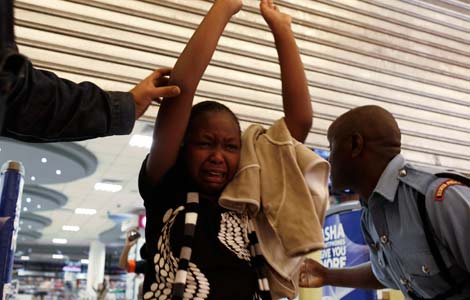Local governments prune unqualified members from Party
Updated: 2013-09-23 07:14
By Wang Zhenghua in Shanghai (China Daily)
|
||||||||
A county in Zhejiang province has expelled 55 unqualified members from the Party in a drive to remove incompetent members.
Another 430 Party members at Pujiang county in central Zhejiang were each given a "yellow card" for their minor shortcomings, told to receive training, and given six to 12 months to correct their faults.
For a long time, the Communist Party of China, with 85 million members by the end of 2012, continued recruiting new members but seldom expelled any unless they committed serious offenses.
The pilot program in Pujiang came after the nation's Party chief, Xi Jinping, urged at a meeting of the top leadership body earlier this year to improve management of the Party's membership and deal in a timely way with unqualified members.
Liang Yanhui, a professor at the Party School of the CPC Central Committee, said on Sunday that the idea of expelling unqualified members was proposed as early as the Party's 13th National Congress in 1987.
"All these years there was a guideline, but how to actually do it was not settled," she said. The attempt at Pujiang is a positive step, she added.
According to the publicity department of Pujiang, those expelled from the Party included a member identified as Xue, who took a job as a fortuneteller.
Xue, along with 54 others, were expelled based on appraisals since April.
The county selected 10 standards from the Party's Constitution and other regulations to determine if a member is competent. These standards include a member's faith and belief, political position, sense of organizational discipline, perspective of the overall situation and awareness of law.
To prevent wrongful dismissal, the county set up a series of procedures that involve an investigation and verification of the offense, an initial appraisal, a preliminary examination by a local Party committee, talks with organization department officials, a decision by the Party branch and final judgment by a local Party committee.
The county's organization department could not be reached for comment on Sunday. But a report by Jinhua Daily in July offers a glimpse of how the appraisals were organized in Pujiang villages.
According to the newspaper, in Qianwu township alone, 24 out of the 550 Party members were viewed as problematic in appraisals conducted by Party and non-Party members. Seven of the 24 didn't participate in Party activities, two violated the nation's family planning policy, five built illegal houses, and others were found not supporting their parents or embroiled in fights.
The Party punished all of them, the report said.
Similar programs have also taken place in Guangdong and Shandong provinces. In Shangdong's Shouguang, which has more than 60,000 Party members, 102 members were expelled last year.
Wu Hui, an associate professor of governance at the Party School of CPC Central Committee, said a big reason that Party members are seldom expelled is the lax implementation of Party regulations.
The population movement also makes it difficult to manage Party members, he added.
To address the problem, an effective way is needed to allow members to leave the Party while being able to appeal if they consider the dismissal or other punishment as unfair, Wu said.
"We need a long-term system rather than whirlwinds of movement to set up an 'exit mechanism' for Party members," he added.
wangzhenghua@chinadaily.com.cn
(China Daily USA 09/23/2013 page3)
Most Viewed
Editor's Picks

|

|

|

|

|

|
Today's Top News
Israeli soldier killed in West Bank shooting
Death toll in Nairobi mall attack rises to 68
Verdict for Bo Xilai: Life in prison
Amber alert across Asia, but not red
China foreign minister at UN
Smithfield shareholder vote Tuesday
China signs 12 deals with Venezuela
Trending news across China
US Weekly

|

|













